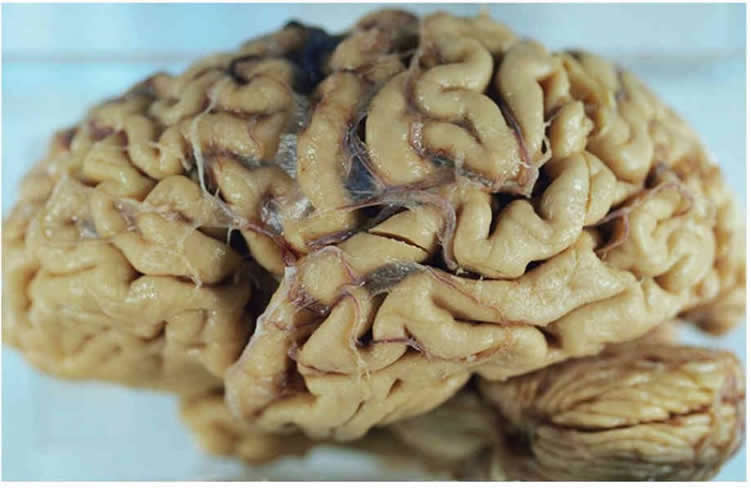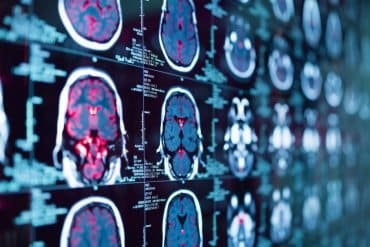Summary: University of Birmingham researchers report a delayed response to processing written words could signify an increased risk of developing Alzheimer’s disease in patients with MCI.
Source: University of Birmingham.
A delayed neurological response to processing the written word could be an indicator that a patient with mild memory problems is at an increased risk of developing Alzheimer’s disease, research led by the University of Birmingham has discovered.
Using an electroencephalogram (EEG) – a test that detects electrical activity in a person’s brain via electrodes attached to their scalp – researchers studied the brain activity of a group of 25 patients to establish how quickly they processed words shown to them on a computer screen.
The study, published in Neuroimage Clinical, was led by the University of Birmingham’s School of Psychology and Centre for Human Brain Health and was carried out in collaboration with the Universities of Kent and California.
The patients who took part were a mix of healthy elderly people, patients with mild cognitive impairment (MCI), and patients with MCI who had developed Alzheimer’s within three years of diagnosis of MCI.
MCI, a condition in which someone has minor problems with mental abilities such as memory beyond what would normally be expected for a healthy person of their age, is estimated to be suffered by up to 20 per cent of people aged over 65. It is not a type of dementia, but a person with MCI is more likely to go on to develop dementia.
Dr Ali Mazaheri, of the University of Birmingham, said: “A prominent feature of Alzheimer’s is a progressive decline in language, however, the ability to process language in the period between the appearance of initial symptoms of Alzheimer’s to its full development has scarcely previously been investigated.
“We wanted to investigate if there were anomalies in brain activity during language processing in MCI patients which could provide insight into their likelihood of developing Alzheimer’s.
“We focused on language functioning, since it is a crucial aspect of cognition and particularly impacted during the progressive stages of Alzheimer’s.”
Previous research has found that when a person is shown a written word, it takes 250 milliseconds for the brain to process it – activity which can be picked up on an EEG.
Dr Katrien Segaert, of the University of Birmingham, adds: “Crucially, what we found in our study is that this brain response is aberrant in individuals who will go on in the future to develop Alzheimer’s disease, but intact in patients who remained stable.
“Our findings were unexpected as language is usually affected by Alzheimer’s disease in much later stages of the onset of the disease.

“It is possible that this breakdown of the brain network associated with language comprehension in MCI patients could be a crucial biomarker used to identify patients likely to develop Alzheimer’s disease.
“We hope to now test the validity of this biomarker in large population of patients in the UK to see if it’s a specific predictor of Alzheimer’s disease, or a general marker for dementia involving the temporal lobe.
“The verification of this biomarker could lead the way to early pharmacological intervention and the development of a new low cost and non-invasive test using EEG as part of a routine medical evaluation when a patient first presents to their GP with concern over memory issues.”
Source: Emma McKinney – University of Birmingham.
Publisher: NeuroscienceNews.com.
Image Source: NeuroscienceNews.com images is in the public domain.
Original Research: Full open access research for “EEG oscillations during word processing predict MCI conversion to Alzheimer’s disease” by Ali Mazaheri, Katrien Segaert, John Olichney, Jin-Chen Yang, Yu-Qiong Niu, Kim Shapiro, and Howard Bowman in NeuroImage: Clinical. Published online October 9 2017 doi:10.1016/j.nicl.2017.10.009
[cbtabs][cbtab title=”MLA”]University of Birmingham. “Delayed Word Processing May Predict Alzheimer’s Risk.” NeuroscienceNews. NeuroscienceNews, 20 October 2017.
<https://neurosciencenews.com/word-processing-alzheimers-7779/>.[/cbtab][cbtab title=”APA”]University of Birmingham. (2017, October 20). Delayed Word Processing May Predict Alzheimer’s Risk. NeuroscienceNews. Retrieved October 20, 2017 from https://neurosciencenews.com/word-processing-alzheimers-7779/[/cbtab][cbtab title=”Chicago”]University of Birmingham. “Delayed Word Processing May Predict Alzheimer’s Risk.” https://neurosciencenews.com/word-processing-alzheimers-7779/ (accessed October 20, 2017).[/cbtab][/cbtabs]
Abstract
EEG oscillations during word processing predict MCI conversion to Alzheimer’s disease
Only a subset of mild cognitive impairment (MCI) patients progress to develop a form of dementia. A prominent feature of Alzheimer’s disease (AD) is a progressive decline in language. We investigated if subtle anomalies in EEG activity of MCI patients during a word comprehension task could provide insight into the likelihood of conversion to AD. We studied 25 amnestic MCI patients, a subset of whom developed AD within 3-years, and 11 elderly controls. In the task, auditory category descriptions (e.g., ‘a type of wood’) were followed by a single visual target word either semantically congruent (i.e., oak) or incongruent with the preceding category. We found that the MCI convertors group (i.e. patients that would go on to convert to AD in 3-years) had a diminished early posterior-parietal theta (3–5 Hz) activity induced by first presentation of the target word (i.e., access to lexico-syntactic properties of the word), compared to MCI non-convertors and controls. Moreover, MCI convertors exhibited oscillatory signatures for processing the semantically congruent words that were different from non-convertors and controls. MCI convertors thus showed basic anomalies for lexical and meaning processing. In addition, both MCI groups showed anomalous oscillatory signatures for the verbal learning/memory of repeated words: later alpha suppression (9–11 Hz), which followed first presentation of the target word, was attenuated for the second and third repetition in controls, but not in either MCI group. Our findings suggest that a subtle breakdown in the brain network subserving language comprehension can be foretelling of conversion to AD.
“EEG oscillations during word processing predict MCI conversion to Alzheimer’s disease” by Ali Mazaheri, Katrien Segaert, John Olichney, Jin-Chen Yang, Yu-Qiong Niu, Kim Shapiro, and Howard Bowman in NeuroImage: Clinical. Published online October 9 2017 doi:10.1016/j.nicl.2017.10.009






